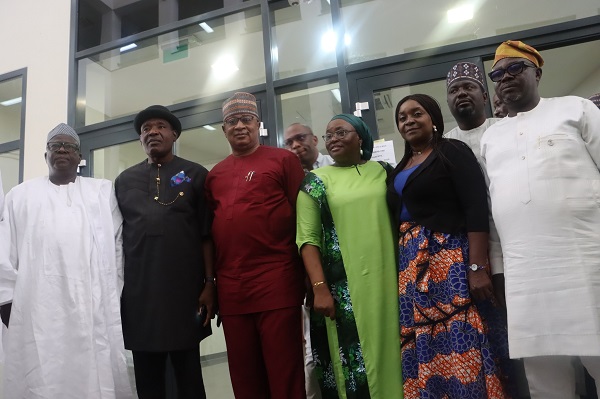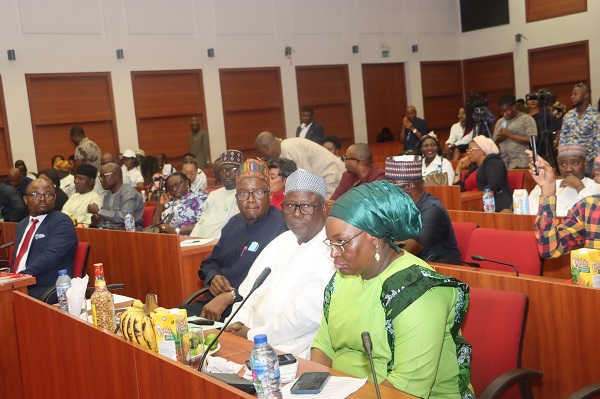
A bill to limit the application of biotechnology suffered a major setback at the ‘public hearing’ organised by the National Assembly’s Senate Committee on Environment.
The bill, which seeks to amend the National Biosafety Management Agency (NBMA) Act 2015 will peg perceived progress made by modern biotechnology in the country if passed.
Key sponsors of the bills failed to appear before the committee to argue their case against scientists present to air their arguments.
The bill seeks to, among other things, criminalise the work of scientists in the country and limit the application of biotechnology to less than 1 per cent. Proponents of biotechnology fear that the bill could give way to lawsuits by “people making frivolous claims”, including the issue of biodiversity regulations.
Many experts and farmers at the public hearing requested the Senate to discard the bill on the ground that the current laws are “perfect and have worked perfectly” in the management of biotechnology in the country.
Speakers at the hearing agreed that the bill could dishearten many professionals from improving the genetic assets of crops for improved yield.
The executive director, Institute of Agricultural Research (IAR) Zaria, Prof. Mohammed Ishiyaku, who was the first to appear before the committee, said that the NBMA Act 2015 remained the best protection for the proactive modern biotechnology in Nigeria. “Amending the bill now will amount to reversing the gains made since the coming of the law in 2015.
“The amendments seek to tight the hands of the scientists and make the practice of science impossible in the country,” he said.
On his part, the director-general, NBMA, Dr. Rufus Ebegba said the amendment sought to “kill the desire of Nigerian scientists to contribute to the socio-economic development of the country but open the country up for dumping of unauthorised GMOs”.

In his comments, the director-general, National Agricultural Biotechnology Development Agency (NABDA), Prof. Abdullahi Mustapha said the amendment was unnecessary and would limit the practice of science in Nigeria.
“Nigeria has enacted deliberate policies that positioned science and technology as the engine to drive the economic, so turning around to set up unnecessary roadblocks will limit science from taking us to our destination,” he said.
Similarly, at the African Agricultural Technology Foundation (AATF) Open Forum on Agricultural Biotechnology (OFAB), project manager, Mr. Vitumbiko Chinoko asked the committee to discard the bill because “you can only fix what is broken”. He insisted that there were no problems with the current law that called for “any amendment”.
He worried that Nigeria which has already established itself as the leading biosafety driver in Africa would lose its position if its biosafety act is amended to limit the scope of researchers in the country.
Another expert, the president, National Biotechnology Biosafety Consortium (NBBC), Prof. Celestine Aguoru said the amendment aims to drive indigenous Nigerian scientists away from the country and, resultantly, could end up limiting their scope while frustrating their efforts.
Similarly, Prof. Chiedozie Egesi, who represented IITA said that the proposal to amend the biosafety law is “retrogressive, as it will further reverse the progress made in biotechnology in Nigeria so far”.
The president, All Farmers Association of Nigeria (AFAN), Arc. Kabir Ibrahim, who also attended the event, emphasised that “all the farmers in Nigeria are in support of biotechnology” and any attempt that is targeted at limiting the scope of biotechnology operation in Nigeria “should not be welcome”.
He said: “I have been farming PBR Cowpea since its inception and I can categorically tell you that the PBR Cowpea is giving me a wonderful experience. I get more thrice the yield of the local beans”.
In his presentation, the former president of the Genetic Society of Nigeria (GSN), Emma Kwon-ndung said that Nigeria has moved past this stage in science and any individual trying to drag the nation backwards should not be given any consideration.
A statement by OFAB’s information officer, Sarah Mela, said the committee appealed to anyone in the hearing who has a contrary opinion to appear and speak before it, as there would be no room for private submission – an act against the Senate’s rules.


